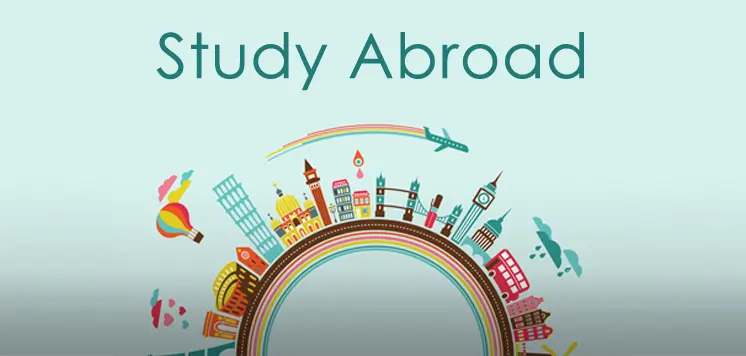When most people think of college, studying is the first thing that comes to mind. It’s a rite of passage for young adults, and it can be an enriching experience, but it’s not always easy. One of the decisions students must make is whether to stay in their home country for school or study abroad. Each option has pros and cons, and one person’s ideal may not be another’s. Both benefits and drawbacks might be associated with studying abroad. Determine what they are.
Pros of Studying Abroad
It’s a great way to learn about other cultures.
One of the primary benefits of studying abroad is that it allows students to learn about other cultures. When students study abroad, they are exposed to new customs, traditions, and beliefs. This can help them to develop a greater understanding and appreciation for other cultures. Additionally, studying abroad can also help students to develop their own cultural identity.
It can help you to learn a new language.
Another benefit of studying abroad is that it allows students to learn a new language. When students are immersed in a new culture, they can learn the local language more quickly and effectively than they would in a classroom setting. Learning a new language can also help students better understand the culture and its people.
It can broaden your perspective.
Studying abroad can also help students to broaden their perspectives. When students leave their home country to study in another country, they are often exposed to different ways of thinking and living. This may enable individuals to adopt fresh viewpoints and broaden their perspectives on life.
It can enhance your employability.
Many employers today are looking for employees who have international experience. Studying abroad allows students to gain the skills and experience employers are looking for. Additionally, employers often view studying abroad as evidence of a student’s ability to adapt to new environments and handle challenging situations.
It can be an adventure of a lifetime.
For many students, studying abroad is an adventure of a lifetime. It allows them to travel to new and exciting places, meet new people, and experience different cultures firsthand. Studying abroad can also be an excellent way to make lifelong friends from all over the world.
Another benefit of studying abroad is that it can help students to develop greater independence. When students are living in a foreign country, they are responsible for taking care of themselves. This can help them to develop important life skills such as time management and budgeting. Living in a foreign country can also help students develop confidence and self-reliance.
Cons of Studying Abroad
It Can Be Expensive
One of the biggest cons of studying abroad is that it can be expensive. While some programs may offer scholarships or financial aid, the cost of tuition, room, board, and travel costs can still be quite high. Additionally, many students find that they need to work while studying abroad to cover their expenses, making it difficult to focus on their studies.
You May Feel Homesick
Another potential downside of studying abroad is that you may feel homesick. This is particularly true if you live in a country where you do not speak the language or are not familiar with the culture. Homesickness can lead to feelings of loneliness and isolation and can make it difficult to adjust to your new surroundings.
There May Be Safety Concerns
Other safety concerns need to be considered, depending on where you choose to study abroad. In addition to political upheaval in some regions, some nations have higher crime rates than others. To secure your safety in the destination of your choice, it is crucial to conduct research before deciding to study abroad.
You May Have Difficulty Adjusting Academically
Another potential con of studying abroad is that you may have difficulty adjusting academically. The curriculum and teaching style in other countries may be different than what you are used to, making it difficult to keep up with your studies. Additionally, the language barrier can make understanding your professors and classmates difficult.
It Can Be Difficult to Get a Job After Graduation
Finally, another downside of studying abroad is that it can be difficult to get a job after graduation. Employers frequently favor applicants who have prior work experience in their native country, so if you spent four years studying overseas, you might find it difficult to compete for jobs with those who completed their studies in their home country.
What to do if your parents don’t want you to study abroad?
It can feel overwhelming and frustrating if you are considering studying abroad and your parents are not on board with the idea. After all, their concerns about safety, cost, and planning are valid; however, these worries should not prevent you from pursuing your goals.
The best way to deal with a resistant or unsupportive parent is to try to understand where their reluctance is coming from. Maybe they are worried about safety or don’t want to expend the extra money for something that isn’t sure. However, you know in your heart that studying abroad is something that will enrich your life and enhance your prospects.
Instead of dwelling on your parents’ concerns or giving up altogether, take steps to communicate with them honestly and compassionately. For example, share information about the program you have chosen and offer to take on more responsibilities at home while you’re away at school so they won’t worry as much. It’s also important to remain open-minded and respect their point of view, even if it differs from yours. By maintaining a positive attitude and standing strong in your convictions, you increase the likelihood that they will eventually come to support your decision to study abroad.
How to convince your parents it’s the right decision for you?
Whenever you make a big decision, such as moving away for college or changing your career path, it can often be difficult to convince your parents that you are ready for such a big step. After all, they want what is best for you and may be hesitant to let you venture out on your own. However, if you are confident in your decision and can clearly articulate why it is the right choice for you, it can be much easier to convince them.
In order to make this argument convincingly, you must show that you have done thorough research and planning. Lay out your reasoning step-by-step, citing concrete examples of how this choice will benefit you, both short-term and long-term.
Additionally, try to engage your parents in an open dialogue about their concerns or hesitations, using these as opportunities to highlight why this new direction is the best way forward for you. In doing so, not only will you be able to present a compelling case for your decision, but you’ll also come away with a better understanding of where your parents are coming from and a stronger relationship with them overall. And who knows? You may even find yourself empowered by their support.
How prepared for studying abroad without your parents?
Before you embark on the exciting journey of studying abroad without your parents, there are some key steps that you need to take to ensure your success. First and foremost, it is essential to prepare a detailed budget to know what expenses you will need to plan ahead of time. This includes everything from transportation costs to housing and food expenses.
You should also familiarize yourself with the host university’s expectations and requirements. This includes everything from course loads and study schedules to acclimating yourself to host country customs and etiquette. Additionally, you must have a solid support network before leaving home.
This might include friends or family members that can help provide emotional or logistical support during your overseas adventure. With these strategies in place, you can be confident as you embark on this exciting new chapter in your life.
How to make the most of your study abroad experience?
Studying abroad is an incredible opportunity to expand your horizons, learn about a new culture, and experience life in a different country. However, this can only be achieved if you make the most of your time abroad. Here are some tips for doing just that:
First, be open to new experiences. This means trying new foods, exploring unfamiliar neighborhoods, and talking to locals about their culture and customs. Remember that travel is more than just seeing sights; it is also about engaging with the new world around you.
Second, take advantage of your host institution’s language classes or tutoring sessions. Immersing yourself in a foreign language will help you feel more comfortable in your new surroundings and give you valuable insights into the local culture and its people. Plus, it can often lead to lifelong connections you might never have otherwise made.
Lastly, try to maintain a balance between studying and having fun. Although it is important to prioritize academic work during your study abroad experience, don’t forget that having fun during downtime is also crucial for truly soaking up all this unique opportunity. Whether you’re spending time with friends or hitting up local attractions on the weekends, always ensure that you enjoy yourself and make the most of every moment.
Conclusion
Studying abroad has unique pros and cons that must be carefully considered before deciding to leave everything familiar behind and venture out into the world. Weighing your options and doing your research is critical to ensure that you have the best possible experience during your time as a student abroad.
Some students feel that the advantages outweigh the disadvantages, while others feel vice versa. No matter what you choose, do your research so you can decide if studying abroad is the correct choice for you.
Read Also : Is a Degree In Psychology Right for You?: 8 Signs the Answer Is Yes!




































































